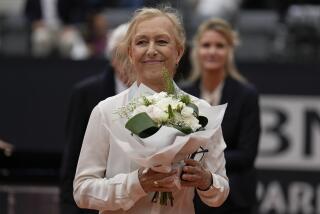Marilyn Quayle Has Surgery for an Undisclosed Illness : Health: Routine Pap test revealed disease in ‘earliest stages,’ spokesman says. The vice president’s wife is expected to make a full recovery.
- Share via
WASHINGTON — Marilyn Quayle, wife of Vice President Dan Quayle, underwent surgery Saturday for an undisclosed disease that was detected at its “earliest stages” by a routine Pap test, and she is expected to make a full recovery, according to Quayle spokesman David Beckwith.
The Pap test is a procedure typically used to screen for cancers of the cervix and uterus.
Beckwith refused to reveal the nature of Mrs. Quayle’s illness, the extent of her surgery or the hospital where it was performed.
“Mrs. Quayle will be able to resume her full schedule in four to six weeks,” he said. “A full and total recovery is expected.”
He added: “The vice president and Mrs. Quayle urge all women to have yearly Pap tests. With early diagnosis, complete cure and total recovery are possible. The Quayle family is thankful that this test was able to detect her disease at its earliest stages.”
The Pap test is a simple procedure that can be performed quickly in a physician’s office as part of a routine pelvic examination. It involves swabbing a small sample of cells from the cervix and body of the uterus, which are later examined under a microscope.
The test is highly effective in detecting early cervical cancer, but it is only partially effective in detecting uterine cancer, according to the American Cancer Society. The test is recommended annually for women over the age of 18, or for any women who are sexually active. The test is also used to discover other problems, such as pre-malignant conditions, hormonal changes and minor infections.
An estimated 46,500 new cases of cervical and uterine cancer will be diagnosed this year, according to the cancer society. These include 13,500 cases of cancer of the cervix--which is the narrow, outer end of the uterus--and 33,000 cases of cancer of the body of the uterus, usually of the endometrium, or lining.
There will be an estimated 6,000 cervical cancer deaths in the United States this year, and 4,000 from endometrial cancer. Overall, the death rate for uterine cancer has decreased more than 70% during the past 40 years, due mainly to early detection through the Pap test. The test was named for Dr. George Papanicolaou, the physician who invented it.
Uterine cancers generally are treated by surgery or radiation, or by a combination of the two, according to the cancer society. In its earliest stages, cervical cancer can be treated by cryotherapy, a procedure that destroys cells by freezing, or by electro-coagulation, which uses electric current, or by local surgery.
For some women, particularly those who already have children and do not expect to have more, physicians recommend a hysterectomy--the surgical removal of the uterus--even when the cancer is detected early. This surgery often requires a recovery period of four to six weeks.
The five-year survival rate for all cervical cancer patients is 67%, according to the cancer society. For patients diagnosed early, however, the survival rate increases to 88%, and jumps to virtually 100% if a Pap test detects disease in its earliest, precancerous stage when cells become abnormal, but have not yet become malignant.
In endometrial cancer, survival rates are 85% overall, 92% if diagnosed at an early stage, and virtually 100% if discovered at the precancerous lesion stage, according to the cancer society.
Mrs. Quayle, whose physician mother died of breast cancer, has become an eloquent advocate for early detection of breast cancer, including increased breast cancer education and awareness, and research. Recently she participated in a highly publicized footrace to raise money for breast cancer research, and she has testified on Capitol Hill on the subject.
Mrs. Quayle, an attorney, turns 41 on July 29. She was given an early roller-skating birthday party by friends last Wednesday. The Quayles have three children, Tucker, Benjamin, and Corrine.
More to Read
Get the L.A. Times Politics newsletter
Deeply reported insights into legislation, politics and policy from Sacramento, Washington and beyond. In your inbox twice per week.
You may occasionally receive promotional content from the Los Angeles Times.










